- C++ Programming Examples
- C++ Programming Examples
- C++: Hello World
- C++: Get Input
- C++: Print Integer
- C++: Add two numbers
- C++: Add, Sub, Multiply, Div
- C++: Add Digits
- C++: Find Average and Percentage
- C++: Find Arithmetic Mean
- C++: Sum of n Natural Numbers
- C++: Sum of n Numbers
- C++: Square's Area and Perimeter
- C++: Rectangle's Area and Perimeter
- C++: Triangle's Area and Perimeter
- C++: Area and Circumference
- C++: Find Simple Interest
- C++: Fahrenheit to Celsius
- C++: Celsius to Fahrenheit
- C++: Print Prime Numbers
- C++: Reverse a Number
- C++: Swap Two Numbers
- C++: Print Multiplication Table
- C++: Find Factorial of a Number
- C++: Find Factors of a Number
- C++: Find HCF and LCM
- C++: Create a Calculator
- C++: Count Digits in a Number
- C++: First and Last Digit Sum
- C++: Product of Number Digits
- C++: Sum of Squares of Digits
- C++: Interchange Digits of Number
- C++ if-else Programs
- C++: Check Even or Odd
- C++: Check Prime or Not
- C++: Check Alphabet or Not
- C++: Check Vowel or Not
- C++: Check Leap Year or Not
- C++: Check Reverse equals Original
- C++: Check Perfect Number
- C++: Check Palindrome or Not
- C++: Check Armstrong or Not
- C++: Divisibility Test
- C++: Find Labor Wage
- C++: Find Discounted Price
- C++: Find Shipping Charge
- C++: Find Telephone Bills
- C++: Calculate Student Grade
- C++: Largest of Two Numbers
- C++: Largest of Three Numbers
- C++ Number Conversion
- C++: Decimal to Binary
- C++: Decimal to Octal
- C++: Decimal to Hexadecimal
- C++: Binary to Decimal
- C++: Binary to Octal
- C++: Binary to Hexadecimal
- C++: Octal to Decimal
- C++: Octal to Binary
- C++: Octal to Hexadecimal
- C++: Hexadecimal to Decimal
- C++: Hexadecimal to Binary
- C++: Hexadecimal to Octal
- C++ Pattern Programs
- C++: Pattern Programs
- C++: Print Diamond Pattern
- C++: Print Floyd's Triangle
- C++: Print Pascal's Triangle
- C++ Array Programs
- C++: 1D Array Program
- C++: Linear Search
- C++: Binary Search
- C++: Largest Element in an Array
- C++: Smallest Element in an Array
- C++: Find Second Largest Element
- C++: Find Second Smallest Element
- C++: Sum of All Elements
- C++: Multiply All Elements
- C++: Element in Even Position
- C++: Element in Odd Position
- C++: Print Even Numbers in Array
- C++: Print Odd Numbers in Array
- C++: Count Even or Odd Numbers
- C++: Sum of Even or Odd Numbers
- C++: Count Positive, Negative, Zero
- C++: Reverse an Array
- C++: Insert an Element
- C++: Delete an Element
- C++: Merge two Arrays
- C++: Bubble Sort
- C++: Selection Sort
- C++: Insertion Sort
- C++: Common Elements
- C++: 2D Array Programs
- C++: Add Two Matrices
- C++: Subtract Two Matrices
- C++: Transpose Matrix
- C++: Multiply Two Matrices
- C++: 3D Array Programs
- C++ String Programs
- C++: Print String
- C++: Find String Length
- C++: Compare Two Strings
- C++: Copy String
- C++: String Concatenation
- C++: Reverse a String
- C++: Delete Vowels from a String
- C++: Delete a Word from a String
- C++: Count Characters in a String
- C++: Count Words in a String
- C++: Frequency of Words
- C++: Remove Spaces from Strings
- C++: Sort a String
- C++: Uppercase to Lowercase
- C++: Lowercase to Uppercase
- C++: Swap Two Strings
- C++: Check the Anagram or Not
- C++: Capitalize All Words in a String
- C++: Get Numbers from a String
- C++ File Programs
- C++: Read a File
- C++: Write Content to a File
- C++: Append Data to a File
- C++: Read and Display File
- C++: Copy a File
- C++: Merge Two Files
- Count Characters in a File
- C++: Capitalize Every Word
- C++: List Files in Directory
- C++: Delete a File
- C++: Encrypt and Decrypt a File
- C++ Misc Programs
- C++: Print ASCII Value
- C++: Add Binary Numbers
- C++: Generate Random Numbers
- C++: Print a Smiling Face
- C++: Days into Years and Months
- C++: Add Two Numbers using Pointer
- C++: Print Fibonacci Series
- C++: Generate Armstrong Numbers
- C++: Find nCr and nPr
- C++: Get IP Address
- C++: Print Date and Time
- C++: Shutdown and Restart Computer
- C++ Programming Tutorial
- C++ Tutorial
C++ program to check whether the given character is an alphabet or not
In this section, you will learn and receive code for determining whether a given character by the user at run-time is an alphabet or not in C++. The program is created in the following two ways:
- Check the alphabet or not using the character itself
- Check whether the given character is an alphabet or not using its ASCII value
In C++, check whether the character is an alphabet using the character itself
To check whether the entered character is an alphabet or not in C++ programming, you have to ask the user to enter a character and start checking for alphabets.
This program uses an if-else statement to check whether the value of a character is greater than or equal to a and less than or equal to z or not. If this condition evaluates to being true, then it is printed as an alphabet.
Otherwise, check for uppercase. That is, it checks whether the value of a character is greater than or equal to A (uppercase) and less than or equal to Z (uppercase) or not. If it evaluates to be true, then print it as an alphabet. Otherwise, if both conditions evaluate to false, then print it as not an alphabet.
The following C++ program asks the user to enter a character to check whether it is an alphabet:
#include<iostream> using namespace std; int main() { char ch; cout<<"Enter a Character: "; cin>>ch; if((ch>='a' && ch<='z') || (ch>='A' && ch<='Z')) cout<<endl<<ch<<" is an Alphabet"; else cout<<endl<<ch<<" isn't an Alphabet"; cout<<endl; return 0; }
This program was built and runs under the Code::Blocks IDE. Here is its sample run:
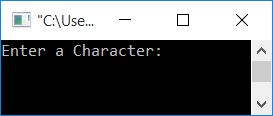
Now supply any input, say "c," and press the ENTER key to check whether "c" is an alphabet or not, as shown in the output given below:
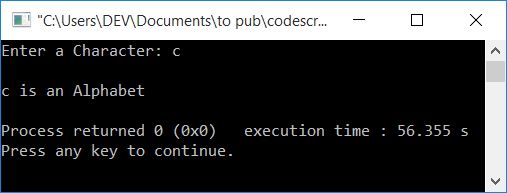
Because c is an alphabet, you have seen the above output. Let's try with another input that is a number, say 3. Here is the output you will see for this case:
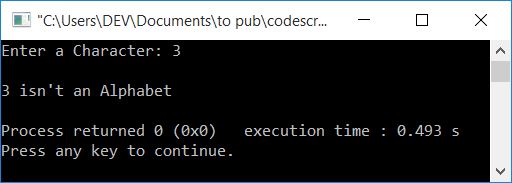
Because 3 is a number and not an alphabet, the program produced the output as shown in the snapshot given above.
If the condition of an if statement evaluates to true, program flow is directed to the if statement's body; otherwise, program flow is directed to else's body.
In C++, check whether the character is an alphabet using its ASCII value
Now let's create the same program, i.e., to check whether the given or input character is an alphabet or not using its ASCII value. But before going through this program, if you're not aware of the ASCII value of alphabets, then here is the table for you:
| Uppercase Alphabet | ASCII Value |
|---|---|
| A | 65 |
| B | 66 |
| C | 67 |
| ... | ... |
| Z | 90 |
| Lowercase Alphabet | ASCII Value |
| a | 97 |
| b | 98 |
| c | 99 |
| ... | ... |
| z | 122 |
Now let's move on and implement it in a program to check for the alphabet or not. The question is, write a program in C++, to receive a character as input and prints whether it is an alphabet or not. The answer to this question is given below:
To check for alphabet using the ASCII value of a character. Then a character is an alphabet if its ASCII value is between 65 and 90 or 97 and 122. Otherwise, it is not an alphabet.
#include<iostream> using namespace std; int main() { char ch; int ascii; cout<<"Enter a Character: "; cin>>ch; ascii = ch; cout<<endl; if(ascii>=65 && ascii<=90) cout<<"It is an Uppercase Alphabet"; else if(ascii>=97 && ascii<=122) cout<<"It is a Lowercase Alphabet"; else cout<<"It is not an Alphabet"; cout<<endl; return 0; }
Here is its sample run with user input as s.
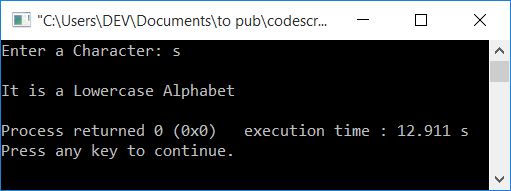
Here is another sample run with user input as S.
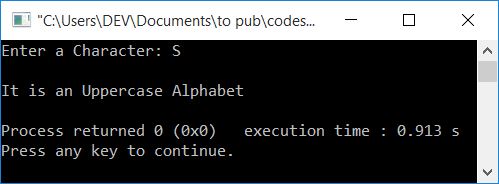
Note: The statement "ascii = ch;" initializes the ASCII value of the character stored in
chto ascii.
The same program in different languages
« Previous Program Next Program »